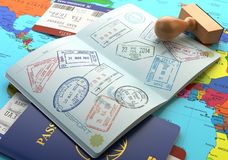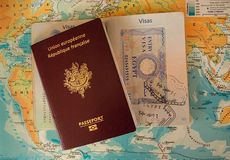In today’s world, traveling has become an integral part of our lives. Be it for leisure or work, many of us find ourselves regularly on the move across borders. However, one integral aspect that you may overlook is the safety of your travel documents. Losing these critical papers can turn a dream holiday into a
19 August 2022
| Post byWith the rise of remote workers, the possibility of working while traveling abroad has become a reality.
Many countries have now introduced special digital nomad visas to cater to these visitors and attract foreign remote workers.

What Is a Digital Nomad Visa?
A digital nomad visa, sometimes known as a workation or working holiday visa, is a special type of visa for remote workers. It allows the holder to do their job from another country for an extended period of time.
Digital nomad visas became popular during the COVID-19 pandemic. With offices closed and lockdowns in place, many people began working from home. This global rise in remote workers led to the idea of continuing to do your job while staying in another country.
Many countries around the world have now introduced their own digital nomad visas to authorize this type of work activity.
Do You Need a Visa to Be a Digital Nomad?
Traditional work visas tend to be aimed at those seeking or accepting employment in the destination country itself, rather than people who want to continue doing their current job remotely.
For this reason, many countries have now introduced a digital nomad visa specifically for this type of worker.
Though regulations vary from country to country, you’ll likely be able to work remotely without a digital nomad visa if you’re staying for a short period.
For instance, if you’re allowed to visit a country visa-free for up to 3 months, you’ll be able to work remotely during your trip.
On short vacations, you can also work on projects remotely with your tourist visa. Check the visa requirements for your destination and apply online.
However, for more long-term stays, particularly when a visa is required, you should apply for a digital nomad visa.

Countries with a Digital Nomad Visa
A number of countries around the world have introduced digital nomad visas, specifically aimed at remote workers looking to relocate.
Below, you can see some of the nations which offer digital nomad visas and their requirements:
Africa
Cape Verde
Cabo Verde Remote Working Program
Length of stay: 6 months, with an option to extend
Requirements:
- Accepted nationalities —All European and North American countries, Community of Portuguese Speaking Countries (CPLP), or the Economic Community of West African States (CEDEAO)
- Average bank balance of at least EUR 1,500 over the last 6 months
Mauritius
Premium Travel Visa for digital nomads and their families
Length of stay: 1 year, with the option to further extend
Requirements:
- Applications accepted from citizens from eligible countries
- Employment by a business outside of Mauritius
- Travel insurance
- Monthly earnings of at least USD 1,500, and an additional $500 per dependent you wish to bring with you
Seychelles
Workcation Program
Length of stay: 1 year
Requirements:
- Proof of employment with a foreign company
- Evidence of regular income
Asia
Indonesia
Second-home visa
Length of stay: 5 years, with the option to extend for 5 more years
Requirements:
- Employment contract with a business based outside of Indonesia
- Bank statement showing at least USD 2,000 during the previous 3-month period
Japan
Japan Digital Nomad Visa
Length of stay: 6 months
Requirements:
- Applicants accepted from around 50 countries
- Valid for remote freelancers, employees, or business owners of non-Japanese companies
- Minimum yearly income of USD 68,000
Malaysia
DR Rantau Nomad Pass
Length of stay: 3 to 12 months, with the option to extend for a further 12 months
Requirements:
- Minimum annual earnings of USD 24,000 per year
- Clean criminal record
- Health and travel insurance
- Passport, with at least 14 months validity
- Proof of income and ability to work remotely
South Korea
South Korea Digital Nomad Visa
Length of stay: up to 2 years
Requirements:
- Remote worker, or freelancer, for a company outside of South Korea
- At least 1 year’s work experience in your field
- Annual salary of at least USD 65,000
- Proof of a clean criminal record
- Health insurance
Taiwan
Employment Gold Card Visa
Length of stay: 1 to 3 years
Requirements:
- Remote worker for a foreign company or Taiwanese business
- Valid for professionals working in the following sectors: education, science and technology, economics, culture and art, sports, law, and architecture
- Other types of professionals can also apply if they earn more than USD 5,600 per month
Europe
Croatia
Digital Nomad Visa
Length of stay: up to 1 year
Requirements:
- You must be a third-country national, meaning you come from or have permanent residence in a non-EU country
- You must be employed by a communication technology business based outside of Croatia
- You need to show a bank statement with a minimum of HRK 28,800, equivalent to approximately USD 4,500
Cyprus
Cyprus Digital Nomad Visa Scheme for self-employed or freelance remote workers and their families
Length of stay: 1 year, with the option to extend for another 2 years
Requirements:
- Minimum monthly income of EUR 3,500, with an additional 20% for your spouse and 15% for each minor
- Your spouse and dependents cannot take up work in Cyprus during your stay
Czech Republic
Zivno Visa
Length of stay: 1 year, with the option to extend further
Requirements:
- License for an approved trade
- Proof of accommodation for at least 12 months
- Bank statement showing at least EUR 5,600
- Local tax charges of around EUR 70 per month
Estonia
Digital Nomad Visa
Length of stay: up to 1 year
Requirements:
- Own a location-independent business, or be employed by a foreign company
- Monthly earnings of at least EUR 3,500 over the previous 6 months
Georgia
Remotely From Georgia Program
Length of stay: up to 1 year
Requirements:
- Valid for digital nomads, remote workers, and entrepreneurs who work remotely
- Applicants accepted from 95 countries
- Minimum monthly earnings of USD 2000, or a bank statement with at least $24,000
Germany
Germany has 2 different digital nomad visas: the Freiberufler and the Aufenthaltserlaubnis für selbständige Tätigkeit.
Freiberufler
Length of stay: can be extended up to 3 years
Requirements:
- Liberal, not commercial, profession
- You’ll be required to pay taxes to the German government
Aufenthaltserlaubnis für selbständige Tätigkeit
Length of stay: 6 months to 3 years
Requirements:
- Valid for digital nomads and self-employed foreigners
- You must work with clients based in Germany
Hungary
White Card, or Type D visa
Length of stay: 1 year, with the possibility to extend for another year
Requirements:
- Valid for non-EU investors, entrepreneurs, and remote workers
- Monthly earnings of at least EUR 2,000
Iceland
Long-term Visa for Remote Work
Length of stay: 6 months for non-Schengen applications, 90 days for Schengen-based applications
Requirements:
- Applications accepted from citizens from non-EU/EEA/EFTA countries
- You cannot apply if you’ve been issued a long-term visa in the last 12 months
- Monthly income of at least USD 7,800
- Visa fee — $60
Latvia
Long-stay Visa for Remote Work
Length of stay: 1 year, with the possibility of extending for a further 12 months
Requirements:
- Applicants accepted from citizens or residents of Organization for Economic Cooperation and Development (OECD) countries, like Canada, Israel, Japan, Mexico, Turkey, the UK, and the U.S.
- Work contract from an organization recognized by the OECD, or be self-employed with a company registered in an OECD country
- Proof of remote monthly income of at least EUR 2,850 over the previous 6 months
Malta
Digital Nomad Residency
Length of stay: 6 months, with the possibility to extend for a further 12 months
Requirements:
- Monthly income of at least EUR 2,700
- Health insurance policy valid for the duration of stay
Norway
Independent Contractor Visa
Length of stay: 2 years
Requirements:
- Self-employed business owners can apply if their company is based outside of Norway and has a Norwegian client
- You must prove that you’re qualified to work in your profession
- Your annual income must be at least EUR 35,700
Portugal
D8 Visa, or Portugal Digital Nomad Visa
Length of stay: 1 year
Requirements:
- Valid for remote workers from countries outside the European Union (EU) and European Economic Area (EEA)
- Minimum monthly earnings of EUR 2,800
- Tax residency documents
- Contract of employment, or proof of self-employment
Romania
Long-stay Visa for Digital Nomads
Length of stay: 12 months, with the possibility of extending for another 12 months
Requirements:
- Proof of accommodation for your stay
- Certificate of a clean criminal record
- Non-Romanian employment contract, or certificate of business-ownership, valid for at least 3 years previous
- Monthly earnings of at least EUR 3,300
Spain
Digital Nomad Visa
Length of stay: 1 year
Requirements:
- Valid for self-employed and remote workers
- 3 years of work experience in the relevant field, or an undergraduate university degree
- Criminal record certificate
- Health insurance
- Annual income of at least EUR 30,000
Middle East
Dubai
Virtual Work Residency Visa
Length of stay: 1 year, with the possibility of further extension
Requirements:
- Medical insurance valid in UAE
- Proof of employment
- 1-year or permanent work contract
- Monthly salary statements
North America
Anguilla
Work from Anguilla Permit
Length of stay: 91 days – 12 months
Requirements:
- Proof of employment or your own business
- Police background check
- Visa fee — USD 2,000 per individual and $3,000 per family
Antigua and Barbuda
Nomad Digital Residence (NDR) for remote workers and their family members
Length of stay: 2 years
Requirements:
- Work remotely for a foreign company, or be self-employed
- Annual salary of at least USD 50,000
- Health insurance
- Visa fee — USD 1,500 for one person, $2,000 for a couple, $3000 for a family of 3 or more
Bahamas
Bahamas Extended Access Travel Stay
Length of stay: up to 1 year, with the possibility of extending by 3 additional years
Requirements:
- Valid for digital nomads and freelancers
- Letter from employer or proof of self-employment
- Proof of income
- Visa and application fee — USD 1,025
Barbados
Barbados Welcome Stamp
Length of stay: up to 1 year
Requirements:
- Remote work for a company based outside of Barbados
- Proof of income of over USD 50,000 per year
- Visa and application fee — USD 2,000 for individuals, and $3,000 for families
Belize
Work Where You Vacation program for remote workers and their families
Length of stay: 6 months, with extension possible
Requirements:
- Employment with a foreign business
- Minimum annual income of USD 75,000, or $100,000 if you’re bringing your family
- Clean criminal record
- Travel insurance policy with coverage of at least $50,000
Bermuda
Work From Bermuda program
Length of stay: 1 year
Requirements:
- Self-employment or a remote work contract with a company based outside of Bermuda
- Travel insurance
Cayman Islands
Global Citizen Concierge Program (GCCP)
Length of stay: 2 years
Requirements:
- Annual salary of at least USD 100,000, or $150,000 for couples
Dominica
Work in Nature Visa
Length of stay: up to 18 months
Requirements:
- Valid for remote workers, digital nomads, and freelancers
- Annual salary of at least USD 50,000
- Visa fee — USD 800 for individuals, and $1,200 for families
Montserrat
Montserrat Remote Workers Stamp
Length of stay: 12 months
Requirements:
- Remote workers or business owners can apply
- Minimum annual salary of USD 70,000
Panama
Short Stay Visa for Remote Workers
Length of stay: 9 months, with the option to extend for a further 9 months
Requirements:
- Valid for digital nomads who work for companies based outside of Panama
- Minimum annual income of USD 36,000
Saint Lucia
Live It program
Length of stay: 1 year
Requirements:
- Proof of remote employment
- No minimum income requirement, but you must have sufficient funds to cover your stay
South America
Argentina
Temporary resident visa
Length of stay: 6 months, with a possible extension of 6 additional months
Requirements:
- You cannot be eligible for a tourist visa
- You must provide your CV
- You have to show evidence of a working relationship with at least 1 employer
Aruba
Short-stay visa for remote workers
Length of stay: up to 90 days
Requirements:
- Return ticket
- Proof of accommodation
- Sufficient income for your stay
Colombia
Visa V Nómadas Digitales
Length of stay: up to 2 years
Requirements:
- Proof of employment with a company based outside of Colombia
- Health insurance
- Monthly income of at least USD 2,100
Curaçao
Length of stay: 6 months
Requirements:
Applicants must provide evidence of 1 of the following:
- A contract with a foreign company
- A partnership or shareholder stake in a business based outside of Curaçao
- Remote digital nomad or freelancer work, with clients who do not live in Curaçao
Ecuador
Rentista for Remote Work
Length of stay: up to 2 years
Requirements:
- Evidence of monthly earnings of at least USD 1,300 in the previous 3 months, or of $15,500 over the past year
Mexico
Temporary Resident Visa
Length of stay: 1 to 3 years
Requirements:
- Valid for remote workers for companies not based in Mexico, or location independent business owners
- Monthly earnings of at least USD 1,620, or a bank balance of $27,000 minimum
Peru
Digital Nomad Visa
Length of stay: 1 year, with the possibility of further extension
Requirements:
- Valid for freelancers, self-employed, or employed people who earn their income from sources outside of Peru
- Proof of accommodation for your stay
- Evidence of your income
How to Get a Digital Nomad Visa
The exact process of applying for a digital nomad visa varies depending on the destination country or territory.
In some cases, you’ll need to visit an embassy or consulate to submit your application. Some countries allow you to make your digital nomad visa application online.
Providing you’re a suitable candidate, most digital nomad visas are relatively easy to obtain. You simply need to submit the requested paperwork and pay any visa fees required. Generally, digital nomad visa applications are more straight-forward than traditional work permits.
Required documents for a Digital Nomad Visa
The supporting documents required to apply for a digital nomad visa may include the following:
- Valid passport
- Proof of income over a certain threshold
- Proof of clean criminal record
- Proof of current employment and/or evidence that you can work remotely
- Bank statement
- Health insurance policy
In most cases, there is also a visa fee that must be paid. The price can vary significantly depending on the country or territory.
How long does it take to get a Digital Nomad Visa?
The processing time for digital nomad visas can vary depending on the issuing country and the volume of applications at the time.
Some applicants may receive their visa for remote work within a week, while others may have to wait several weeks.
Other Questions about Digital Nomad Visa
You can find more information about digital nomad visas below. Here are some of the most frequently-asked questions about this type of visa.
Who qualifies as a digital nomad?
Digital nomad is a broad term which describes people who work remotely, typically outside their home country.
The concept could relate to employees of a company who work from home, or self-employed business owners, or freelancers, who are able to work from different locations.
Some digital nomads travel frequently and move from country to country, while others set up a permanent or semi-permanent base in another country.
Whatever your remote work circumstances, it’s essential to get the right visa if you’re working abroad long-term.
How much does a digital nomad visa cost?
The cost of a digital nomad visa varies depending on the destination. Certain countries offer these visas free of charge, while others can cost upwards of USD $1,000.
The majority of digital nomad visas have a fee of around USD $200-$500.
Do digital nomads pay tax with this type of visa?
Tax rules for digital nomads are generally dictated by the visa they are traveling with. Rules on remote work and tax vary from country to country.
In most cases, remote workers pay tax in what is considered their tax residency country. Where you live and how long you stay there can impact your status as a non-taxed or taxed resident.
Consult the terms and conditions of your digital nomad visa to get individualized information on tax rules.
What is the validity of a Digital Nomad Visa?
Digital nomad visas may be valid for different periods of time depending on the country of issue.
Many allow remote workers to stay for extended periods, including up to a year, or even longer in some cases.
Others are valid for a matter of months and must then be renewed.
Check the criteria of the visa for your destination country before applying to make sure you understand the rules for that digital nomad visa.
Related News
Venturing abroad is an exciting experience, filled with new cultures to explore, foods to taste, and vistas to see. However, before immersing oneself in these novel experiences, one must navigate the labyrinthine process of obtaining a visa. While the general rule of thumb dictates that visa requirements ask you for a sober, straightforward exchange of
Traveling the world can be an enriching experience, opening doors to new cultures, customs, and unforgettable memories. However, not all countries are as welcoming to tourists, and obtaining a visa can be a daunting task. In this article, we’ll explore the hardest countries to get a visa for, and the reasons behind their strict visa
A passport is the key to traveling abroad. However, some passports are considered to be “stronger” than others. The world’s most powerful passports are those that offer the greatest travel freedom. The strongest passports are those that allow the holder to enter the most countries easily, without extra entry requirements, such as visas. There are



